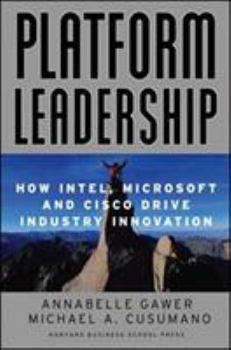Platform Leadership: How Intel, Microsoft, and Cisco Drive Industry Innovation
Select Format
Select Condition 
Book Overview
Based on lessons from successful high-technology platform leaders, this book explains the dynamics of these highly complex and interconnected processes and partnerships. It provides a study of how companies successfully become platform leaders - companies whose products provide the basic technological architecture on which other products and systems are built (such as the microprocessor and Windows Operating System). The authors discuss how platform...
Format:Hardcover
Language:English
ISBN:1578515149
ISBN13:9781578515141
Release Date:April 2002
Publisher:Harvard Business Review Press
Length:336 Pages
Weight:1.52 lbs.
Dimensions:1.2" x 6.3" x 9.7"
Related Subjects
Biography & History Bridges & Routers Business Business & Investing Business & Management Company Profiles Economics Entrepreneurship Industries & Professions Information Management Leadership Management & Leadership Manager's Guides to Computing New Business Enterprises Science & Math Small Business & Entrepreneurship TechnologyCustomer Reviews
5 ratings
Everyone wants a bigger piece of the pie
Published by Thriftbooks.com User , 16 years ago
"Design decisions affect the organization of production, and modular designs provide the means for people to divide up the work in tasks or groups of task that are relatively independent of each other. Modularity in product design has a powerful impact on innovation: Innovation can happen on modules of the product without having to impact the overall system." The building a Platform is a cooperative effort with financial incentives associated with wealth sharing that are compelling. "The ability for an increased number of actors to innovate separately on different modules of systems is radically altering the nature and stability of relationships between firms that make core products and the developers of complementary products." For example, IBM platform of hardware and software was most internally development. When the PC Junior was introduced with the DOS operating system, external parties clone the hardware and DOS, not being contractual obligated to a hardware platform flourished. Intel's vision of a chipset, bus, usb, and graphic accelerator architecture provided the platform for thousands of software applications the leverage the benefits of standardization interfaces with hardware, sdks, and component reuse. A platform leader can benefit and maybe highly dependant on innovations developed at other firms. "No single company can replicate all the innovative capabilities of the market." "As a result, nearly all the platform leader we observed have had to work closely with other firms to create initial applications and then new generations of complementary products." Cooperation means getting a bigger piece of pie. Industries that center their business on platform products receive an increase in value of the platform as more incentives increase for complimentary products and this stimulates more people to buy or use the core product. Scope of the firm: This lever deals with what the firm does internally and externally to produce complimentary components. Product technology: Decisions regarding the architecture of the product and vision of the broader platform; decisions about modularity and the degree of openness of the interface, and how much information about the platform and its interfaces to disclose to outside firms. Relationship with external complementors: The lever centers on determining how collaborative versus competitive should be the relationship be. Platform leaders need to be considered about gaining consensus with their partners and how to deal with potential conflicts of interest. "Decisions on the architecture or design of the product and on how to treat intellectual property tend to have a major impact on the incentives and ability of external firms to innovate". Internal organization: The issue of culture and process is at issue. There needs to exist an internal atmosphere that encourage debate and accelerates the strategy reformulations that may become necessary. Platforms discussed: Intel, Microsoft, Cisco, Pal
It's good to have powerful friends!
Published by Thriftbooks.com User , 19 years ago
This book is an extension of the excellent Sloan (MIT) article Ms. Gawer co-wrote a couple of years back. The book does an excellent job of articulating the concepts of modularity in design, and the management of technology ecosystems. It is easier to gain a market if your interests are aligned around a platform that is well organized. At the same time, the large platform leaders she cites (Intel, Microsoft, Cisco) are hardly benevolent organizations....so it seems that a small degree of skepticism should accompany accepting anything that the 'platform leader' offers. This look at what leadership means is very enlightening, and made me wonder how open source solutions can succeed without a change in tactics.
Excellent read
Published by Thriftbooks.com User , 22 years ago
I bought this book as part of my MBA thesis. This is an excellent read and full of useful insights. Mssrs Gawer and Cusumano are clearly gurus in this subject.
Brilliant strategy for circumventing anti-trust law
Published by Thriftbooks.com User , 22 years ago
"a highly effective way of skirting antitrust law" - Professor Ross Anderson. This brilliant book shows how to lock in your customers and lock-out your competitors without falling foul of anti-trust law. Read, learn, inwardly digest ... then go out and make a killing. No serious marketing executive can ignore this book.
important for open-source enthusiasts as well
Published by Thriftbooks.com User , 22 years ago
Having spent five years trying to establish an open-source software platform standard, in retrospect it would have been awfully nice to have had this book. If you're going to compete with the big commercial firms you have to be comparable to or better than they are in as many areas as possible.





